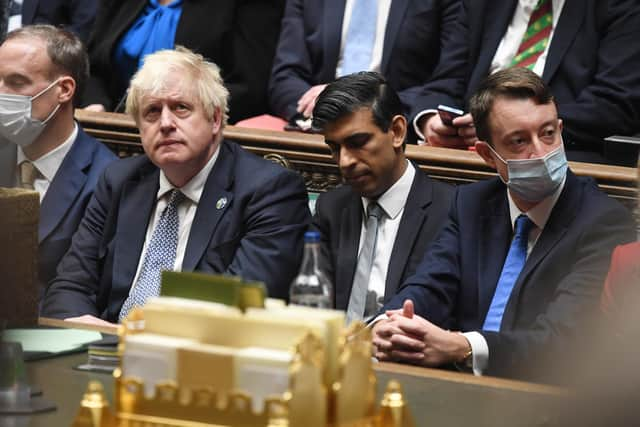Boris Johnson presses on with National Insurance hike despite MPs’ concern over cost-of-living crisis
The PM has been facing pressure from within his own party to scrap or at least delay the national insurance increase to win back support as he awaits the findings of Whitehall and police inquiries into claims of lockdown-busting parties held in Downing Street.
No 10 had still not received a copy of the highly-anticipated Sue Gray report on Saturday evening.
Advertisement
Hide AdAdvertisement
Hide AdIt comes as tensions remain high between Russia and Ukraine, with Mr Johnson expected to speak to President Vladimir Putin and travel to the troubled region early this week.


Speculation over who might run to replace Mr Johnson if he is ousted continued on Saturday.
In the morning, Tom Tugendhat, a backbench Tory MP who has been critical of the Government’s handling of the Afghanistan withdrawal, became the first to announce that he intends to stand for leader if there is a contest soon.
The Foreign Affairs Committee (FAC) chairman told Times Radio: “I think I’m making it pretty clear that I think that it’s up to all of us to put ourselves forward. And it’s up to the electorate, in the first case parliamentary colleagues, and in the second case the party, to choose.
“I think it’s a position of absolute integrity to say that of course you should offer yourself to the electorate if you think you can do it. Of course you should talk to colleagues and see if you can get a group together, and if you can get a group together you should go for it.”
It is widely believed that either Chancellor Rishi Sunak or Foreign Secretary Liz Truss are frontrunners to win the top job if the Prime Minister is deposed.
On Saturday evening, the Independent reported that the Chancellor was putting the final touches to a leadership bid after telling allies he believed the scandal over alleged parties in Downing Street and Whitehall could be “unsurvivable” for the PM.
But the newspaper cited a source close to Mr Sunak as saying these claims were “totally false”.
Advertisement
Hide AdAdvertisement
Hide AdMr Johnson and Mr Sunak put on a united front as they made a firm commitment to go ahead with a controversial tax rise designed to tackle the Covid-induced NHS backlog and reform social care.
Writing in The Sunday Times, the pair insisted that it is right to follow through on the “progressive” policy.
“We must clear the Covid backlogs, with our plan for health and social care – and now is the time to stick to that plan. We must go ahead with the health and care levy. It is the right plan,” they said.
“It is progressive, in the sense that the burden falls most on those who can most afford it.
“Every single penny of that £39 billion will go on these crucial objectives – including nine million more checks, scans and operations, and 50,000 more nurses, as well as boosting social care.”
Mr Johnson and Mr Sunak said they are both “tax-cutting Conservatives”, but there is “no magic money tree”.
“We believe passionately that people are the best judges of how to spend their own money,” they said.
“We want to get through this Covid-driven phase, and get on with our agenda, of taking advantage of our new post-Brexit freedoms to turn the UK into the enterprise centre of Europe and the world.
Advertisement
Hide AdAdvertisement
Hide Ad“We want lighter, better, simpler regulation, especially in those new technologies in which the UK excels. We are also Thatcherites, in the sense that we believe in sound money. There is no magic money tree.”
In April, national insurance is due to rise by 1.25 percentage points for workers and employers.
From 2023, it is due to drop back to its current rate, with a 1.25% health and social care levy then applied to raise funds for improvements to care services.
Political opposition to the change has come from all sides of the Commons, as MPs fear the impact that cost of living pressures could have on stretched household budgets.
Inflation is at a 30-year high after the coronavirus pandemic and the energy price cap is due to lift in the spring, possibly increasing bills by 50%.
Labour has regularly voiced criticism over the fiscal move, with party leader Sir Keir Starmer calling it the “wrong thing to do”.
